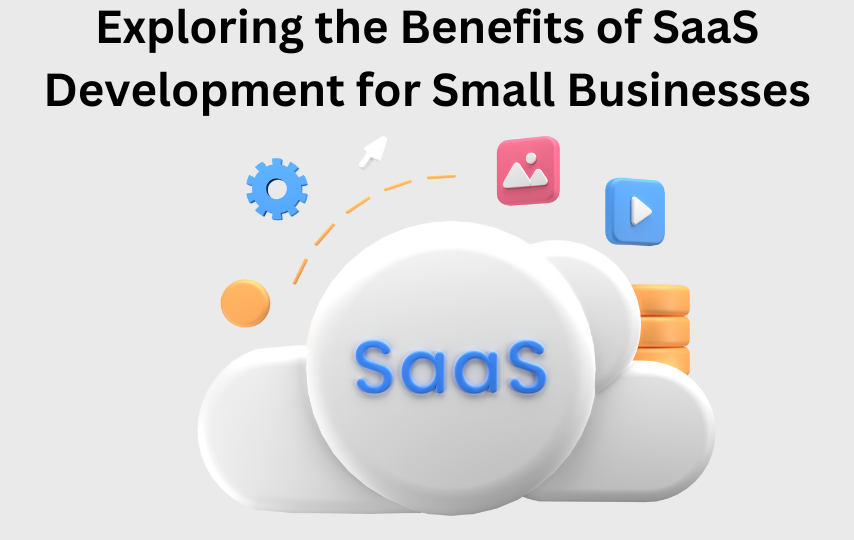In today’s digital world, technology plays an important role in driving growth and success for small businesses. Software as a Service (SaaS) is a remarkable technological innovation that has brought about important changes in the business- world. Let’s explore the various benefits that SaaS development offers to small businesses. From its cost-effective nature to its enhanced security features, we will delve into the details of how SaaS development benefits small businesses.
Cost-Effectiveness and Affordability
The traditional approach to software acquisition often involves hefty upfront costs. This includes not only purchasing licenses but also investing in the necessary hardware to run the software. These financial barriers can be particularly daunting for small businesses with tight budgets. Here’s where SaaS shines. SaaS employs a subscription-based model, allowing businesses to pay for software usage on a regular basis. This means no upfront hardware or software expenses, making it much more affordable for small businesses to access top-tier software.
The beauty of SaaS doesn’t end there. It offers scalability without the need for significant investment. Small businesses can start with a basic subscription and seamlessly upgrade as their needs expand. This flexible approach ensures that resources are invested where they matter most – the core business activities that drive growth.
Real-world examples of cost-saving triumphs through SaaS abound. From startup success stories to boutique retail outlets, various businesses have managed to significantly reduce costs by adopting SaaS solutions.
Accessibility and Flexibility
Gone are those times when you were tied down to your office computer for accessing important business tools. SaaS brings a fresh dimension of accessibility, enabling users to reach software from anywhere as long as there’s an internet connection. This kind of universal access brings a whole new dynamic for small businesses. Now, employees can work from a distance, team up effortlessly, and remain in touch with their work responsibilities from practically any place they can think of.
In addition, SaaS applications are designed with compatibility in mind. It works smoothly on a wide array of devices, ranging from desktop computers to tablets and smartphones. This seamless functionality across different devices ensures that users can access and use the software easily.
Real-world scenarios showcase the power of improved accessibility. Imagine a small startup with a team spread across different cities. Through cloud-based SaaS tools, they manage tasks effortlessly, enhancing their overall workflow and efficiency.
Automatic Updates and Maintenance
Staying up-to-date with software features and security against security vulnerabilities is a challenge. Traditional software needs manual updates, which can be time-consuming and trouble-making.On the other hand, SaaS providers handle these updates automatically. This helps businesses are always equipped with the latest features and protected against emerging cyber threats.
For small businesses, automatic updates translate to reduced IT workload. Without the need to dedicate resources to ongoing software maintenance, the IT team can focus on strategic projects that contribute to the business’s bottom line.
Real-world examples of the power of automatic updates are seen in instances where vulnerabilities are swiftly addressed through SaaS updates, preventing potential security breaches.
Focus on Core Competencies
Small businesses often wear multiple hats, but SaaS enables them to focus on their strengths. With the SaaS business model, the management of intricate software is outsourced to specialized providers. This delegation frees up valuable time and resources, allowing small businesses to concentrate on what they do best – their core competencies.
The ripple effect is improved productivity and efficiency. By leveraging SaaS solutions, a local marketing agency, for instance, can automate routine tasks. This empowers their team to dedicate more energy to crafting innovative strategies that drive client engagement and satisfaction.
Enhanced Security and Data Protection
For small businesses, data protection is paramount. SaaS development company understand this concern and are dedicated to implementing robust security measures. This includes data encryption, adherence to industry regulations, and proactive risk management. With SaaS, small businesses can operate with confidence, knowing that their sensitive data is safeguarded against potential breaches.
Real-life cases underscore the success of data protection through SaaS usage. Whether it’s a financial institution or a healthcare provider, businesses across sectors have fortified their data security through the robust security measures of SaaS solutions.
Trial Periods and Scalability
One of the standout features of SaaS is the availability of trial periods. Small businesses can dip their toes in the water, test-driving SaaS tools before committing to a subscription. This ensures that the chosen solution aligns seamlessly with their specific requirements and workflow.
Scalability is another strong suit of SaaS. As small businesses expand, they can effortlessly scale their SaaS services without the need for substantial upfront investments. This scalability aligns perfectly with the evolving needs of a growing business.
Real-life success stories showcase businesses that started with modest SaaS subscriptions and rapidly scaled their operations as their enterprise flourished.
Customization and Integration
Small businesses are unique, and their software solutions should reflect that. SaaS offers a remarkable level of customization, allowing businesses to cherry-pick specific features or modules that cater to their operations. This means crafting a tailored solution without the financial burden of extensive development costs.
Moreover, SaaS applications are designed to integrate seamlessly with existing software. This eradicates compatibility concerns that often arise when introducing new software. For example, a small e-commerce venture can effortlessly integrate its SaaS-based inventory management system with its online store, ensuring smooth order processing and customer satisfaction.
Customer Support and Training
SaaS providers understand that their success hinges on the success of their customers. Small businesses benefit from a wealth of customer support resources. This includes tutorials, documentation, and responsive customer service, all aimed at helping businesses make the most of their SaaS tools.
Small businesses can rest assured that their concerns will be promptly addressed, thanks to dedicated troubleshooting assistance. The voices of small business owners who have navigated challenges with the guidance of robust SaaS support serve as a testament to the commitment of SaaS providers.
Streamlined Collaboration and Communication
Good communication and collaboration are important for small businesses in today’s world to succeed. SaaS solutions offer built-in communication tools such as instant messaging, video conferencing, and collaborative document editing. These tools help to seamless interactions among team members, irrespective of their physical locations.
Small businesses can leverage SaaS-based collaboration platforms to enhance teamwork on projects, share real-time updates, and collectively contribute to documents. For instance, a small creative agency can use SaaS collaboration tools to collectively brainstorm ideas, review design drafts, and provide timely feedback, resulting in faster project completion and improved client satisfaction.
Predictable and Transparent Costs
Budgeting and financial planning are really essential for small businesses, that help you while you are on a tight budget. When you purchase regular software, it can end up costing you additionally than you expect. You might have to spend for things like software updates, keeping the software running smoothly, and even upgrading your computer equipment. In contrast, SaaS operates on a subscription model with predictable recurring costs. This transparency empowers small businesses to allocate resources effectively and avoid costly surprises down the road.
The predictability of SaaS costs is beneficial for startups and small businesses, it helps to manage their cash flow carefully. By monitoring these SaaS companies need to know how and where their money is spent, it will help make an informed decision in crucial times and it improves the operational function and financial cost of their companies.
Rapid Deployment and Time-to-Value
Small businesses often need to adapt quickly to changing market dynamics and seize opportunities swiftly. Traditional software deployment can be a time-consuming process, it needs complex installations and configurations. On the other hand, SaaS solutions are designed for rapid deployment.
SaaS applications are cloud-based technology and it accessible through web browsers, it eliminates the need for extensive setup processes. This speed-to-market advantage enables small businesses to implement new tools and solutions within hours or days, rather than weeks or months. Consequently, small businesses can capitalize on emerging trends, enter new markets, or address customer demands promptly, ultimately accelerating their time-to-value.
For instance, a small online retailer could quickly integrate a new SaaS-based e-commerce platform to capitalize on a trending product, seamlessly expanding their product offerings and driving revenue growth.
Conclusion
In the dynamic landscape of modern business, SaaS development emerges as an invaluable ally for small businesses. SaaS offers many benefits for small businesses. It helps them to save money, improves access to technology, enhances security, and permits easy scalability. SaaS for small businesses uses advanced technology, as compared to getting traditional software which use low cost and less complexity. SaaS plays an important for small businesses to grow and come up with new ideas. Right now, it is a great time for small business owners to try out Software as a Service and use it to succeed in the digital age.







